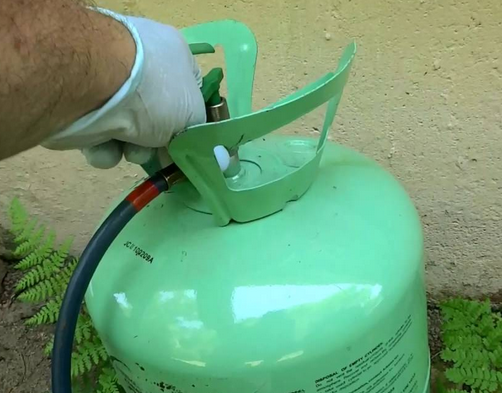In order to maintain a suitable indoor climate, especially on hot, muggy summer days, air conditioning is a crucial element. But, it can be annoying and uncomfortable when your AC isn’t operating at its best. Low refrigerant is one of the frequent problems that might affect your air conditioning system.
Refrigerant is the substance that cools the air in the AC unit. Low refrigerant levels might cause the AC to struggle, resulting in reduced efficiency and higher energy costs. We’ll go over what causes low refrigerant, the running an AC with low refrigerant, and how to avoid it in this article.

What Causes Low Refrigerant?
A crucial step in the air conditioning process is the use of refrigerant.
It is in charge of pulling heat from the air, releasing it outside, and bringing cool air into your house.
Read also: How To Check Freon In Home AC
But, refrigerant can leak over time or become too low for various causes, leading to a refrigerant shortage in your air conditioning system. Common causes of low refrigerant levels include the following:
- Leaks in the refrigerant lines or coils
- Wear and tear of the refrigerant lines or coils over time
- Improper installation of the AC system
- Damage to the AC system due to accidents or natural disasters
The Risks of Running AC with Low Refrigerant
Running your AC with low refrigerant can have several negative impacts, including:
- Reduced efficiency: Low refrigerant levels can cause your AC to work harder than usual, leading to decreased efficiency and increased energy bills.
- Increased wear and tear: When your AC is low on refrigerant, it has to work harder to cool the air, which can lead to increased wear and tear on the compressor and other components.
- Ice buildup: When refrigerant levels are low, the evaporator coils can freeze over, leading to ice buildup and decreased efficiency.
- Damage to the compressor: The compressor is responsible for circulating refrigerant throughout the AC system. When refrigerant levels are low, the compressor can overheat and fail, leading to costly repairs.
How to Prevent Running AC with Low Refrigerant
The best way to prevent low refrigerant levels in your AC system is to have it serviced regularly by a professional technician. During a maintenance visit, the technician will check the refrigerant levels and refill them if necessary. Regular maintenance can also help identify any leaks or issues before they become major problems.
In addition to regular maintenance, you can also prevent low refrigerant levels by:
- Changing your air filters regularly: Dirty air filters can restrict airflow and cause your AC to work harder, leading to increased wear and tear and decreased efficiency.
- Keeping the outdoor unit clean: Debris and dirt can build up on the outdoor unit, causing it to work harder and potentially leading to refrigerant leaks.
- Checking for leaks: If you notice any signs of refrigerant leaks, such as hissing sounds or a lack of cool air, contact a professional technician immediately to have it repaired.
Conclusion
Operating your air conditioner with insufficient refrigerant can negatively affect both your comfort and your money. If you think your air conditioner may be running low on refrigerant, call a qualified technician to assess the situation and top off the refrigerant levels as needed.
Regular maintenance and upkeep can also assist prevent low refrigerant levels and guarantee that your air conditioning system is operating at its best.
Take proactive measures to keep your AC system operating efficiently and don’t allow low refrigerant levels ruin your summer.